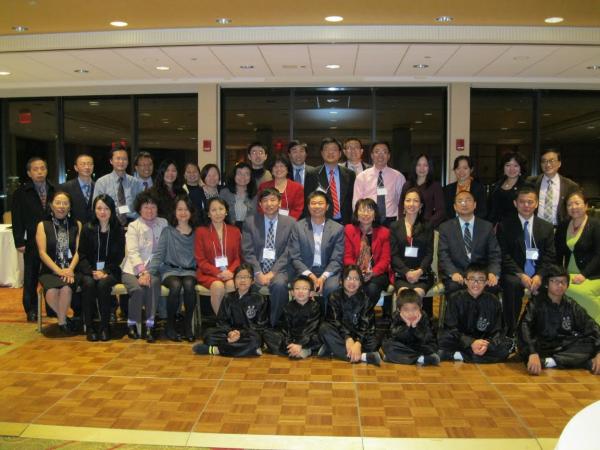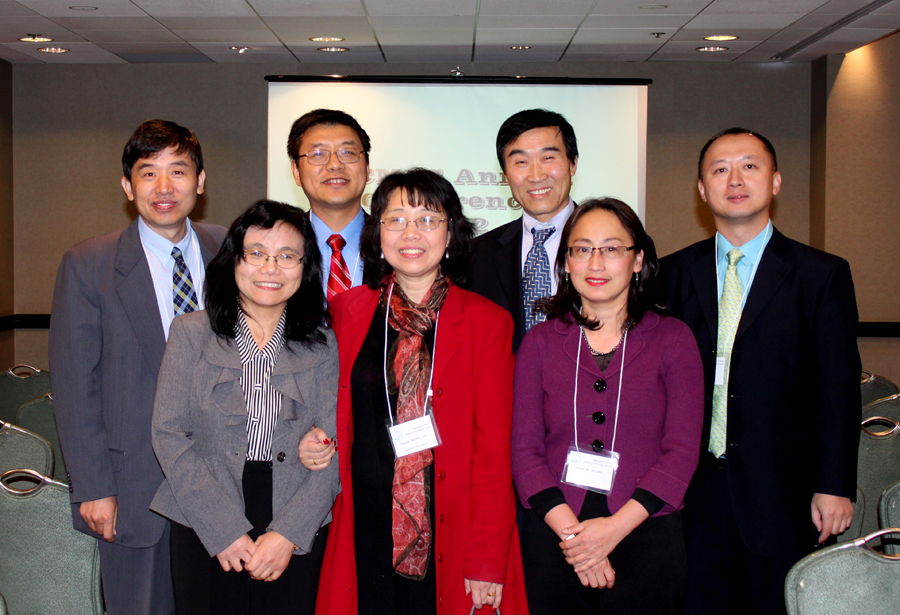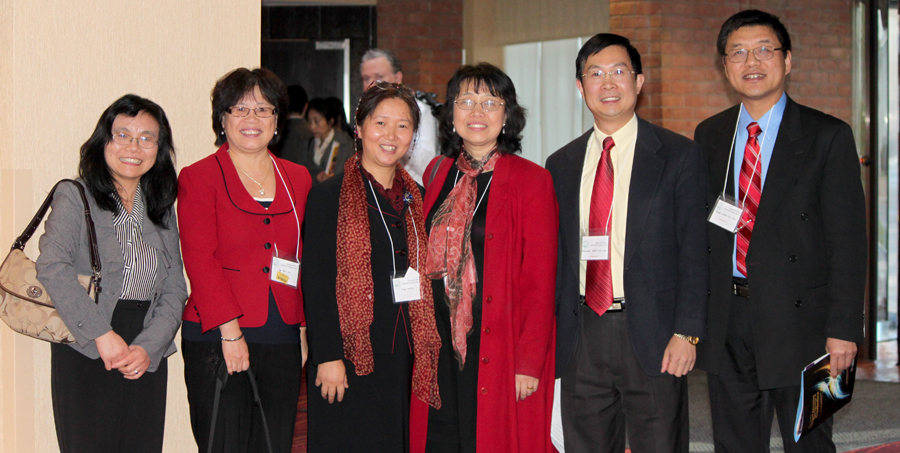ACMES Annual Conference 2012

On November 3, 2012, ACMES held its annual conference entitled “primary care and integrative medicine” at Hyatt Regency Cambridge, along the scenic Charles River in Boston. More than 200 medical professionals from all over the country, as well as international scholars and physicians from China, attended the conference.
The conference has two parallel tracks. One of them is primary care, which is chaired by Dr. Weigen Li, vice president of ACMES and a hospitalist from Jordan’s hospital; and the other is integrative medicine, which is chaired by Dr. Zhao Liu, medical director of ACMES and an endocrinologist from Beverly hospital. Dr. Jie Zhou, and Dr. Lichao Chen, both from Harvard Medical School, served as moderator for the two meeting rooms.
Primary care track started with an oncology panel and was moderated by Dr. Frank Chen, MD, Associate Professor of Pathology from State University of New York at Buffalo. Three physicians from Harvard affiliated Beth Israel Deaconess Medical Center, Dr. Elizabeth Buchbinder, Dr. Anand Mahadevan, and Dr. Hao Wang, covered advances in immunotherapy, radiotherapy, and lung cancer screening and therapy. Dr. Buchbinder summarized recent advances in both specific and nonspecific immunotherapy and previewed possible breakthroughs in the near future. Dr. Mahadevan demonstrated the improvement of efficacity and reduction of normal tissue injury by using stereotactic radiotherapy. Dr. Wang discussed the value of CT in screening and early diagnosis of lung cancer. He also reaffirmed that smoking cessation was the most important measure in lung cancer prevention. Their talks led to active discussions among participants and excited the audience.
In a separate talk, Dr. Jiguang Zhu, Associate professor of neurosurgery from the University of Texas Medical School at Houston, update the audience on the current and novel therapeutic modalities for malignant gliomas. Dr. Jinaren Mao, professor of anesthesia research from MGH, Harvard Medical School, provided clinical guideline of Opioid use for primary care physicians. Both talks impressed the audience with their depth and breadth on the up to date medical information.
The topic of lunch CME lecture was “chronic liver disease and hepatic encephalopathy.” Dr. Keqin Hu, Professor of Medicine from University of California at Irvine, systemically reviewed the topic and the recent progress on hepatic encephalopathy. For example, he mentioned that Lactulose is one treatment option, and Rifaximin appears to be more effective. These are good news for patients who suffer from hepatic encephalopathy.
In the afternoon, Dr. Margo Hudson from Brigham & Woman’s Hospital started the session on optimizing glycemic control in type 2 diabetes. She reviewed the application of insulin as well as the new generation of medication for diabetes to provide a fine tuned control for the disease. Dr. Jingtai Cao, associate director of ophthalmology from Regeneron Pharmaceuticals, described his journey from a physician to a scientist and an inventor. His company developed VEGF-Trap-eye, which was approved by FDA last year to treat ‘wet’ or neovascular form of age-related macular degeneration (AMD). Lastly, Dr. Wenliang Chen, staff surgeon from Jordan Hospital updated the audience on the application and advances of laparoscopy surgery. As the surgery has the benefits of smaller incision, lower cost, and quicker recovery comparing to traditional surgical techniques, more patients could benefit from it.
The next session was led off by Dr. Nanci Yuan, Professor of Medicine from Stanford University. She imparted her rich experience and insight in the field of sleep medicine to her colleagues in primary care. Her talk on the diagnosis and treatment of sleep apnea was well received. Next, Dr. Shiaoyu Lee, assistant professor of Harvard Medical School, talked about managing menopause in women, and Dr. Min Le from the same institution reviewed male hypogonadism. There talks were interesting and informative. Finally, Dr. Thomas Liu, from Weill Medical College of Cornell University, shared his knowledge on how to treat irritable bowel syndrome.
The morning session for integrative medicine is centered on autism. The first speaker is the director of the Great Plains Laboratory, Dr. William Shaw. As a father of an autistic child himself, Dr Shaw has investigated treatment options for autism for years. He has helped improved the lives of thousands of autistic children and their parents. His talk described newly identified links between the metabolites of gut clostridia bacteria and the pathogenies of autism.
The next speaker, Dr.Martha Herbert, pediatric neurologist of MGH/Harvard Medical School and a well-known autism expert entitled her talk as “Autism Revolution.” She proposed a new model on autism spectrum disorder based on her research and clinical practice. She believes that autism is not merely a mental illness or a physiological disorder, but the result of systemic interactions among genes, environment, development, as social and culture factors and a whole body disease. She signed her books with the same title after her talk to enthusiastic audience.
Another autism parent and a researcher, Dr Shen Luan, from Berg Diagnostics, offered hope that new biomarkers for autism may be on the horizon. Every autistic patient costs 1.4 to 2.3 million dollars a year. And cognitive behavior therapy is quite effective for autistic children if early diagnosis can be made. Indeed, autism disorder is becoming a potential social problem is current epidemic is not halted. Some parents of autistic children in audience expressed interest to participate experiments for early diagnosis, but Dr.Luan also pointed out that early detection of autism was still challenging.
The last speaker in the morning was Dr. Hon Ho, a pediatric psychiatrist from the North Shore Medical Center. He shared his clinical experience on using psychiatric drugs to treat autism. He suggested that some psychiatric drugs should be prescribed with caution, starting at a low dose and adjusting the dose slowly. It is important to monitor the patients for potential side effects. He also encouraged parents of autistic children to seek second opinions when deciding to use psychiatric drug treatment.
The theme shifted to alternative medicine in the afternoon. Dr. Shubai Liu and Dr. Wu Hao joined to moderate the afternoon session. Dr. Albert Yeung, a psychiatrist from MGH and an associate professor of Harvard Medical School, pointed out that one-third Americans with health problems are looking for alternative treatments. Qigong has great potential and it has been widely used in the treatment and rehabilitation of many medical and psychological disorders. He also described several clinical trials to treat derepression or diabetes mellitus in elderly patients.
Dr. Yeung's colleague at MGH, Dr. Lucy Chen, assistant professor of anesthesiology at Harvard Medical School, extended the topic of alternative treatment with applications of acupuncture in pain management. Dr. Chen pointed out that there are 5 million patients in the US have used acupuncture as alternative treatments. She explained that there were more than 2,000 acupuncture points on the surface of human body. In addition, acupuncture is safe. In one study, no serious complications were found among 60,000 cases of acupuncture or moxibustion treatment. She also discussed with the audience on insurance coverage of acupuncture treatment.
Licensed acupuncturist Dr. Jing Liu gave a lecture on the topic of "fatigue and integrative approach." Dr Liu has been studying traditional Chinese medicine at MGH for over 15 years. His deep knowledge in the field piqued the interest of the audience. After the analysis of the relationship between fatigue and hormone imbalance, especially adrenal insufficiency. He noted that some Chinese herbs, such as ginseng, Siberian Ginseng, rhodiola rosea, glycyrrhiza, withania, are particularly effective in treating patients with chronic fatigue.
Professor John Zhang from Beijing Traditional Chinese Medical College explored the topic of acupuncture in treating complications in cancer. He pointed out that "the Yellow Emperor's internal classic" introduced acupuncture and moxibustion for treatment of tumors and cancer more than 3,000 years ago. He also gave multiple examples of successful treatment in his clinical experience.
Finally, Dr. Ming Wong, who has been practicing integrative medicine for over 30 years in the greater Boston area. He overviewed philosophical approaches adopted by Western and Chinese Medicine. He quoted Erwin Schrödinger to define life as having negative entropy. And he criticized traditional western medical practice as “zombie” medicine.
The conference also invited two attorneys from distinguished law firms to address legal issues related to medical community. Mr. David Gould from Ficksman & Conley taught the techniques to deal with litigation and Board of Registration inquiries. He cautioned physician to carefully follow clinical procedures and enhance communication with patients to avoid unnecessary incidents. Attorney Daniel Heffernan from Kotin, Crabtree & Strong explained the rights of children with special needs, education arrangements, and arbitration process if there is a dispute. He pointed out that there are resources available for parents to protect their children’s rights in Massachusetts. The last speaker Alan Chew from Newyork Life introduced to the audience on estate planning and irrevocable living trust.
The evening reception and banquet were held at Charles View Ball Room with a panoramic view of Charles River and Boston. A lot of people took the opportunity to network and discuss with colleagues and friends. The evening program was hosted by Xylina Wu, the vice president of ACMES, who flew in from Texas, and Raymond Liu, marketing advisor of ACMES, professor of business at University of Massachusetts of Boston. Dr. Douglas Levine, vice president of Ironwood Pharmaceuticals, was introduced by Dr. Xiangyang Yu. Dr. Levine’s talk is “New Era of IBS treatment” and he presented a newly FDA approved drug that is developed by his company.
Dr. June (Xuejun) Kong, the president of ACMES (www.acmes.net) reviewed the mission and achievement of this non-profit organization. In 2012, ACMES has held more than a dozen academic meetings and CME seminars as well as journal clubs, workshops, and other community programs such as free clinics. In addition, ACMES has contributed on Sino-American medical exchange, especially, training of Chinese physicians. Two focuses of ACMES is autism treatment and Hepatitis B screening. Both have made fruitful progress this year. Moreover, both English Journal NAJMS (www.najms.net) and Chinese Journal NAJMH (www.najmh.net) have steadily increasing readerships and contributors. VIP guests are speakers of the conference received latest issues (October, 2012) from both journals as gifts.
Dr. Kong also introduced and thanked board members and other core team members of ACMES with deep gratitude. She emphasized that one person, however capable, always has limitations. On the other hand, a team, working together, will make a much bigger contribution the community. She presented community service award to Dr. Lichao Chen and Ms. Juanzi Liu.
The entertainment program included Guzheng (Chinese plucked zither) performance by master musician Ms. Hui Weng, young Soprano Ms.Ying Wang’s “O mio babbino caro” and “when I have sung my song to you”, and “my dear motherland” by Prof. Ramond Liu, and Kung Fu performance by children of Wah Lum Kung Fu and Tai Chi Academy. One highlight of the evening is the Yi JinTaiji Exercise, invented by the co-founder and the director of natural medicine of ACMES. The dance was performed by Juanzi Liu, Zhao Liu, JingJing Liu, and Yuquan Chen and won accolades from the audience. After that, many people went down to the dancing floor, and were led by master Ballroom dance teacher Ms. Ye Wu, dancing together to finish the evening program on a high note. At this point, the annual conference wrapped with grace joyce and beauty. Indeed, ACMES is positioned to contribute to the promotion of global health and well-being, improving quality of life.






